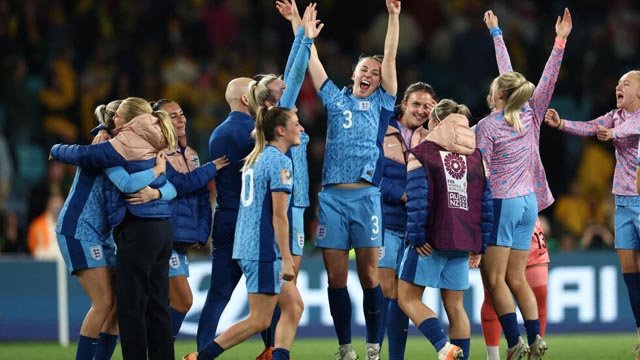
A Women’s World Cup that has broken records on and off the pitch will reach a suitable climax on Sunday when England or Spain are crowned champions for the first time.
About 75,000 fans will pack Stadium Australia in Sydney for the final of a World Cup that began with 32 teams, compared to 24 four years ago, and saw many of the favourites fall early.
Germany bowed out in the group phase together with Brazil, Italy and Olympic champions Canada, then holders the United States followed them out the trapdoor in the last 16 — their earliest exit ever, AFP reported.
South Africa, Jamaica and Morocco all reached the last 16 for the first time, and Colombia made a maiden quarter-final appearance before a 2-1 defeat to England.
The exploits of the lower-ranked sides are evidence that the gap has closed significantly in international women’s football, but in the end, it is two of the leading sides who will contest the final.
– ‘Fairytale’ for Wiegman –
Sarina Wiegman’s England are European champions and came into the World Cup as favourites along with the United States.
But like Spain, England have never reached the World Cup final before.
The two teams met in the quarter-finals of last year’s European Championship, with Wiegman’s Lionesses winning 2-1 in extra time and going on to beat Germany in the final for their first major title.
On that occasion, England had the backing of fervent home support, a luxury they will not have this time. If anything, Australian fans at the final are likely to cheer for Spain.
The anticipated sell-out crowd at Stadium Australia will bookend a tournament that is the best-attended in Women’s World Cup history.
Wiegman has a world-class squad to call upon, but it is the coach herself who is arguably England’s biggest asset.
She is the standard-bearer for woman coaches, having won the Euros with her native Netherlands and then repeating the feat with England.
Described by her players as calm but direct, Wiegman took the Dutch to the World Cup final four years ago, where they lost 2-0 to the United States.
“Having the chance as a coach or a player to make it to two finals is really special,” the 53-year-old said after her side defied a partisan crowd to defeat co-hosts Australia 3-1 in Wednesday’s semi-final.
“I never take anything for granted, but it’s like I’m living in a fairytale or something.”
Wiegman is already hugely respected in her adopted country but now she is one victory away from joining Alf Ramsey, who took England to the men’s title in 1966, in winning a World Cup for England.
– Turmoil ‘made Spain stronger’ –
Spain have defied turmoil off the pitch to make their own history.
Their preparations were clouded by a dispute with 15 players who last year said they no longer wanted to be considered for selection.
Coach Jorge Vilda and his strict personality were chief among a litany of complaints, but here they are, missing 12 of the 15 but on the cusp of world domination.
England have not been perfect in reaching the final and needed penalties to see off Nigeria in the last 16, before more convincing displays in defeating Colombia and Australia.
But Spain have also had their challenges at this tournament.
They were thumped 4-0 by Japan in their final group game, the caveat being that both teams had already qualified for the knockout rounds.
Spain then thrashed Switzerland 5-1 and squeezed past the Netherlands and Sweden by identical 2-1 scorelines, the victory over the Dutch coming in extra time.
Vilda says that the turmoil that once threatened to torpedo their World Cup “made all of us stronger”.
“Now we can file it away and put it behind us and think about the future, and think that we deserve to be where we are,” he said after Olga Carmona’s sumptuous 89th-minute strike propelled them past Sweden in the semi-finals.
It is proof of Spain’s depth of resources that they have hardly missed the players who refused to play under Vilda.
On top of that, reigning two-time Ballon d’Or winner Alexia Putellas has been reduced to a bit-part role as she struggles to regain form and fitness after injury.
In her place, Barcelona playmaker Aitana Bonmati — who had been part of the protesting 15 — has emerged as Spain’s creative force and the player England must stop.
 Weekly Bangla Mirror | Bangla Mirror, Bangladeshi news in UK, bangla mirror news
Weekly Bangla Mirror | Bangla Mirror, Bangladeshi news in UK, bangla mirror news







